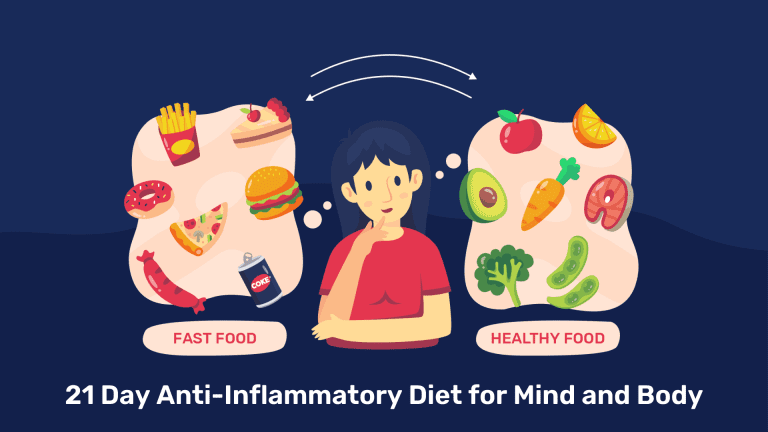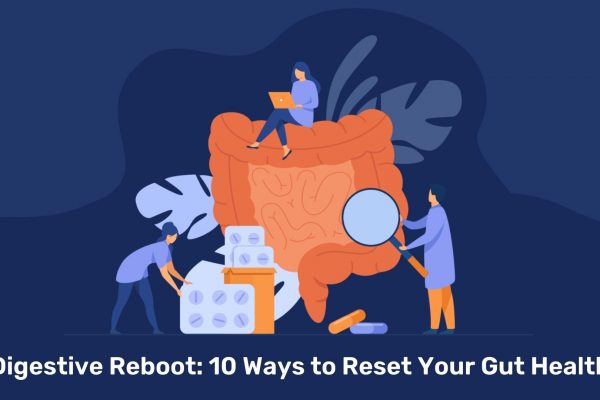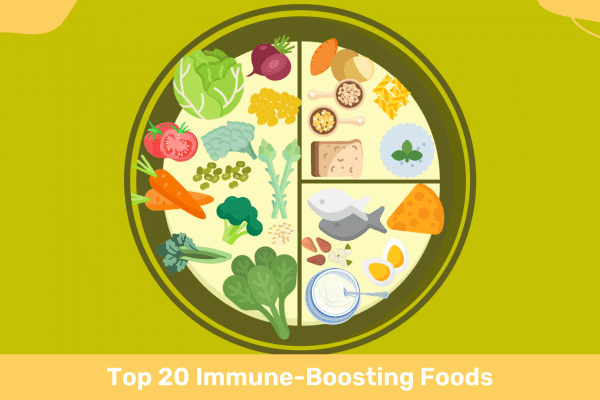Introduction
Welcome to the transformative journey of the 21-Day Anti-Inflammatory Diet – a scientifically-backed path to vitality, wellness, and renewed vigor. In a world where modern lifestyles often usher in chronic health challenges, this comprehensive program offers a beacon of hope, rooted in evidence and tailored to empower you in your pursuit of optimal well-being.
Inflammation is a vital part of the body’s immune response, can become a double-edged sword when chronic and unchecked. Research conducted by prominent institutions, including the National Institutes of Health (NIH), has revealed a strong correlation between chronic inflammation and a wide array of health concerns. From cardiovascular diseases and diabetes to autoimmune disorders and even certain cancers, the consequences of prolonged inflammation are far-reaching and impactful.
Over the course of the next three weeks, you will embark on a journey of discovery and transformation. You’ll learn to make informed choices about the foods you consume, the habits you cultivate, and the way you nurture your body. Each day will bring you closer to understanding the profound impact that dietary decisions can have on your overall health and well-being.
Through this immersive experience, you’ll not only gain valuable knowledge but also practical tools to implement positive changes in your life. The 21-Day Anti-Inflammatory Diet is more than a diet – it’s a comprehensive lifestyle shift that empowers you to take control of your health destiny. By making conscious choices and embracing a nourishing, anti-inflammatory approach, you have the potential to unlock a renewed sense of vitality, energy, and resilience.
As you embark on this journey, remember that you’re not alone. Countless individuals have walked this path before you, and their success stories vividly underscore the potential for transformation that lies ahead. So, let’s eagerly dive into the transformative journey – embracing 21 days of nourishment, rejuvenation, and the promise of a healthier, more vibrant you.
What does body inflammation mean?
Inflammation, serving as a complex biological response, safeguards the body against harm, including pathogens and damage. This intrinsic mechanism aids healing and initiates repair. Initially protective, inflammation becomes problematic with prolonged persistence.
Chronic inflammation is pivotal in various health issues’ development, unlike temporary, localized acute inflammation. Think of it as a smoldering fire beneath the surface. While less evident than acute inflammation, continual release of immune signals disrupts balance, leading to cellular damage and tissue breakdown.
Reasons for acute-to-chronic transition are diverse, encompassing factors like poor diet, stress, and sleep deprivation. This journey underscores inflammation’s nuanced nature, both protective and harmful.
In the 21-Day Anti-Inflammatory Diet, gain actionable insights to navigate health complexities, fostering vitality and resilience.
The Inflammatory Impact on Corporate Employees
In the dynamic and often demanding world of corporate employment, individuals are exposed to a unique set of factors that can contribute to an increased risk of inflammation. Modern work environments, characterized by long hours, sedentary habits, high stress levels, and poor dietary choices, can collectively create a perfect storm for the development of chronic inflammation. Here’s how corporate employees might find themselves prone to inflammation:
1. Sedentary Lifestyle
Many corporate jobs involve prolonged periods of sitting, often in front of computers. This sedentary behavior has been linked to reduced physical activity and impaired metabolic health, both of which can contribute to inflammation.
2. High Stress Levels
The competitive nature of corporate environments, tight deadlines, heavy workloads, and interpersonal dynamics can increase stress levels. Chronic stress triggers the body’s stress response system, releasing stress hormones that, over time, can lead to inflammation.
3. Poor Dietary Choices
Fast-paced work days can lead to reliance on processed and convenient foods, which are often high in unhealthy fats, sugars, and refined carbohydrates. These dietary choices can promote inflammation by disrupting the body’s natural balance.
4. Sleep Disruptions
Erratic work schedules, late-night emails, and the pressure to perform can interfere with sleep quality and duration. Poor sleep has been linked to increased levels of inflammation.
5. Lack of Physical Activity
Due to time constraints and fatigue, regular exercise might take a back seat. Physical activity is known to have anti-inflammatory effects, and its absence can contribute to inflammation.
6. Exposure to Indoor Pollutants
Office buildings can harbor indoor pollutants, such as volatile organic compounds (VOCs) from furnishings and inadequate ventilation. Prolonged exposure to these pollutants can contribute to inflammation and respiratory issues.
7. Mental Health Challenges
The pressure to meet targets, maintain productivity, and navigate workplace dynamics can impact mental health. Conditions like anxiety and depression have been linked to increased inflammation.
8. Irregular Eating Patterns
Meetings, deadlines, and work commitments might disrupt regular eating patterns. Skipping meals or eating irregularly can lead to imbalances in blood sugar levels, potentially triggering inflammatory responses.
9. Excessive Screen Time
Corporate work often involves prolonged screen time, which can lead to digital eye strain and disrupted circadian rhythms, potentially influencing inflammation.
10. Limited Sun Exposure
Spending most of the day indoors might result in inadequate sun exposure, leading to vitamin D deficiency, which has been associated with increased inflammation.
It’s important to note that not all corporate employees will experience these factors to the same degree, and individual susceptibility to inflammation can vary. However, recognizing these potential triggers is crucial for promoting employee well-being. Companies that prioritize wellness initiatives, flexible work arrangements, ergonomic setups, and access to healthier food options can help mitigate the inflammatory impact of corporate environments.
Inflammatory Foods Chart
Here’s a list of common inflammatory foods that you might want to limit or avoid in your diet. Keep in mind that individual responses to these foods can vary, and moderation is key. It’s recommended to consult with a healthcare professional or registered dietitian before making significant changes to your diet, especially if you have specific health conditions.
Inflammatory Foods to Limit or Avoid:
|
Food Group |
Inflammatory Foods |
| Processed Foods | – Fast food |
| – Packaged snacks (chips, crackers) | |
| – Sugary cereals | |
| – Frozen meals | |
| – Pre-packaged baked goods | |
| Trans and Saturated Fats | – Fried foods |
| – Margarine and shortening | |
| – High-fat dairy products | |
| – Fatty cuts of red meat | |
| Refined Carbohydrates | – White bread and rolls |
| – Pastries and cakes | |
| – White rice and pasta | |
| Sugary Foods and Drinks | – Soda and sugary beverages |
| – Candy and sweets | |
| – Commercially baked cookies | |
| Processed Meats | – Hot dogs, sausages, and bacon |
| – Deli meats | |
| – Canned meat products | |
| Alcohol | – Excessive alcohol consumption |
| High Sodium Foods | – Canned soups and broths |
| – Processed and packaged foods with added salt | |
| – Fast food and takeout meals |
What does an Anti-Inflammatory Diet mean?
An anti-inflammatory diet is a nutritional approach focused on consuming foods that have been shown to reduce inflammation in the body. Inflammation is a natural response of the immune system to protect the body from harmful stimuli, such as infections or injuries. However, chronic inflammation, which persists over time, has been linked to a range of health issues, including cardiovascular disease, diabetes, autoimmune disorders, and certain cancers.
The goal of an anti-inflammatory diet is to help modulate the body’s inflammatory response by incorporating foods rich in nutrients that have been shown to have anti-inflammatory properties. Such a diet typically emphasizes whole, nutrient-dense foods and limits or avoids foods that are known to promote inflammation.
Key Principles of an Anti-Inflammatory Diet:
Rich in Fruits and Vegetables: These foods are packed with vitamins, minerals, antioxidants, and fiber that help combat inflammation. Berries, leafy greens, colorful vegetables, and citrus fruits are often highlighted.
Healthy Fats: Focus on consuming sources of healthy fats, such as avocados, nuts, seeds, and fatty fish like salmon. These foods contain omega-3 fatty acids, which have potent anti-inflammatory effects.
Lean Protein: Choose lean sources of protein, such as poultry, fish, legumes, and tofu. These options provide essential amino acids without the saturated fats found in some animal products.
Whole Grains: Opt for whole grains like brown rice, quinoa, whole wheat, and oats. These grains provide complex carbohydrates and fiber, which can help stabilize blood sugar levels and reduce inflammation.
Spices and Herbs: Certain spices and herbs, like turmeric, ginger, garlic, and cinnamon, have natural anti-inflammatory properties and can be included in dishes.
Healthy Beverages: Hydration is important, so focus on water, herbal teas, and even green tea, which contains compounds with potential anti-inflammatory effects.
The 21-Day Anti-Inflammatory Diet: A Journey to Wellness
Embarking on a 21-day anti-inflammatory diet offers you the opportunity to reset your eating habits, rejuvenate your body, and experience the transformative power of nourishing foods. This structured plan is designed to help reduce chronic inflammation and promote overall well-being. Let’s dive into the details of this journey:
Week 1: Preparing the Foundation
Days 1-3: Begin by focusing on whole, unprocessed foods. Fill your plate with an array of colorful fruits and vegetables, aiming for at least 5 servings per day. Incorporate lean proteins such as poultry, fish, tofu, and legumes. Experiment with herbs and spices known for their anti-inflammatory properties, like turmeric and ginger. Hydration is key, so prioritize water and herbal teas.
Days 4-7: Build on the foundation by introducing healthy fats. Include sources of omega-3 fatty acids such as fatty fish (salmon, mackerel), flaxseeds, chia seeds, and walnuts. Opt for whole grains like quinoa, brown rice, and oats, and replace refined carbohydrates with these options. Limit or avoid processed foods, sugary snacks, and sodas.
Week 2: Deepening the Anti-Inflammatory Effect
Days 8-10: Embrace nutrient-dense snacks. Nuts, seeds, and fresh fruit can provide satisfying options that keep your energy levels stable. Experiment with smoothies using ingredients like leafy greens, berries, and plant-based proteins. Minimize consumption of red and processed meats.
Days 11-14: Shift your focus to gut health. Incorporate fermented foods like yogurt, kefir, sauerkraut, and kimchi. These foods contain probiotics that support a healthy gut microbiome, which plays a role in inflammation regulation. Continue to prioritize lean proteins and antioxidant-rich foods.
Week 3: Sustaining the Lifestyle
Days 15-17: Explore plant-based protein sources. Incorporate more beans, lentils, and other legumes into your meals. These foods provide fiber, protein, and an array of vitamins and minerals. Continue to enjoy omega-3-rich options like flax seeds and fatty fish.
Days 18-21: As you approach the final stretch, reflect on your journey. Notice any changes in your energy levels, digestion, and overall well-being. Continue to choose whole, unprocessed foods and experiment with new recipes. Reflect on your relationship with food and how it impacts your body.
Throughout the 21 Days:
- Stay Hydrated: Water, herbal teas, and green tea should be your go-to beverages. Limit or avoid sugary drinks and excessive caffeine.
- Mindful Eating: Practice mindful eating by savoring each bite, eating slowly, and paying attention to hunger and fullness cues.
- Physical Activity: Incorporate regular physical activity into your routine. Exercise has anti-inflammatory effects and complements the benefits of the diet.
- Stress Management: Engage in stress-reduction techniques such as deep breathing, meditation, or yoga. Chronic stress can contribute to inflammation.
- Sleep: Prioritize adequate sleep. Aim for 7-9 hours of quality sleep each night to support overall health and inflammation regulation.
Monitoring and Beyond:
Throughout the 21 days, keep a journal to track your progress, emotions, and any changes you notice. After the initial 21 days, consider reintroducing certain foods mindfully to see how your body responds. This can help you identify specific triggers of inflammation.
Remember, the 21-day anti-inflammatory diet is not a quick fix, but a starting point for a lifelong approach to wellness. It’s a journey of exploration, education, and empowerment, aimed at creating sustainable habits that contribute to reduced inflammation and improved overall health. Always consult with a healthcare professional or registered dietitian before making significant dietary changes, especially if you have existing health conditions or concerns.
Conclusion
As you conclude your 21-day anti-inflammatory diet journey, take a moment to celebrate the commitment you’ve made to your well-being. This transformative experience has empowered you with knowledge about the impact of nutrition on inflammation and equipped you with practical tools to make informed dietary choices. Remember that this journey is just the beginning of a lifelong pursuit of vitality and wellness.
Discover the Power of Woliba: Your Partner in Wellness
If you’re eager to continue your exploration of nutrition, wellness, and reducing inflammation then look no further than Woliba. Our platform is dedicated to providing you with comprehensive resources, expert insights, and a supportive community to guide you on your wellness journey.
Empower yourself with the knowledge and support you need to live a life free from the burdens of chronic inflammation. Contact us today to learn how Woliba can be your trusted companion on your journey to optimal health. Embrace the potential for transformation – your vibrant, inflammation-free life awaits.





